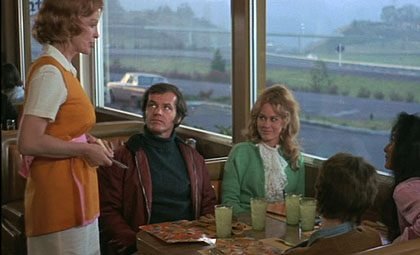What's Good?
The waitress, who we loved, responded to our request for a pasta suggestion with enthusiasm. "Get the ravioli," she said. "It's amazing."
I was with my mom last night at the new A Voce in the Time Warner Center, and our waitress was solicitious, funny and helpful. And when we asked for her advice, she gave it with zeal and genuine enthusiasm. But it was only when we were eating the ravioli, which she so heartily recommended, that I began to question the wisdom of asking the server's advice on what to order.
After all, if it's a good restaurant, shouldn't all the dishes be good? And if you're not particularly craving ravioli--in this case, filled with taleggio and served with chanterelles and brown butter--mightn't you do just as well ordering the thing you are in the mood for, like the spaghetti alla Chitarra (with crab, leeks and sea urchin butter)? Or the orecchiette with roasted pork jowl, soffrito and arugula?
The point is: if you have a good rapport with your server, it's often natural--and somewhat respectful, I think--to ask what they recommend. It brings them into the process, it shows that you value them and what they do, and often times it can lead to delicious food.
My problem with it, though, is that often, if a server makes a recommendation, I will feel a social obligation to follow it. Especially if the recommendation is delivered with great gusto, with words like: "You have to get the ___, it's the best thing on the menu!"
How do you look your server in the face after that and say, "Gee, I appreciate your enthusiasm, but I'm sort of in the mood for ___."
Sure, they're professionals, they can handle it. But my ultimate point is: how much do you gain from seeking their advice in the first place? Wouldn't I have been just as happy with the spaghetti or the orecchiette last night, maybe even more happy? At a good restaurant where all the food's good (and believe me, all the food we ate at A Voce was top notch), what's the point of asking "what's good"?
I can think of a few scenarios where asking "what's good?" does make sense:
* A seafood restaurant, where some fish might be fresher than other fish. Asking what's good--or, more appropriately, "what's fresh?"--might steer you towards a better option, assuming the server is knowledgeable about the fish swimming in and out of the kitchen.
* A not-so-good restaurant where you genuinely need the server's help navigating the menu. For example, you're on a road trip and you stop into a hole-in-the-wall and the place looks, to use a David Letterman phrase, a bit "hinky." Asking the server "what's good?" is probably a good idea, assuming the server themselves isn't hinky.
But, more times than not, if you're out to dine, you're better off trusting your own instincts--what you're in the mood for--than deferring to your server. After all, as I Tweeted last night, what's the difference between asking a server "what's good?" and asking the person at the movie theater box office what movie to go see?
Sure, a good server at a good restaurant probably takes much more pride in their work, but that doesn't change the fact that what to order--like what movie to go see--is a question more of taste and mood than it is a question of objective analysis. If you're genuinely at a loss, asking "what's good?" might help you narrow the field, but if you're craving something specific, follow your gut. The only person who can really answer the question "what's good?" is you.

